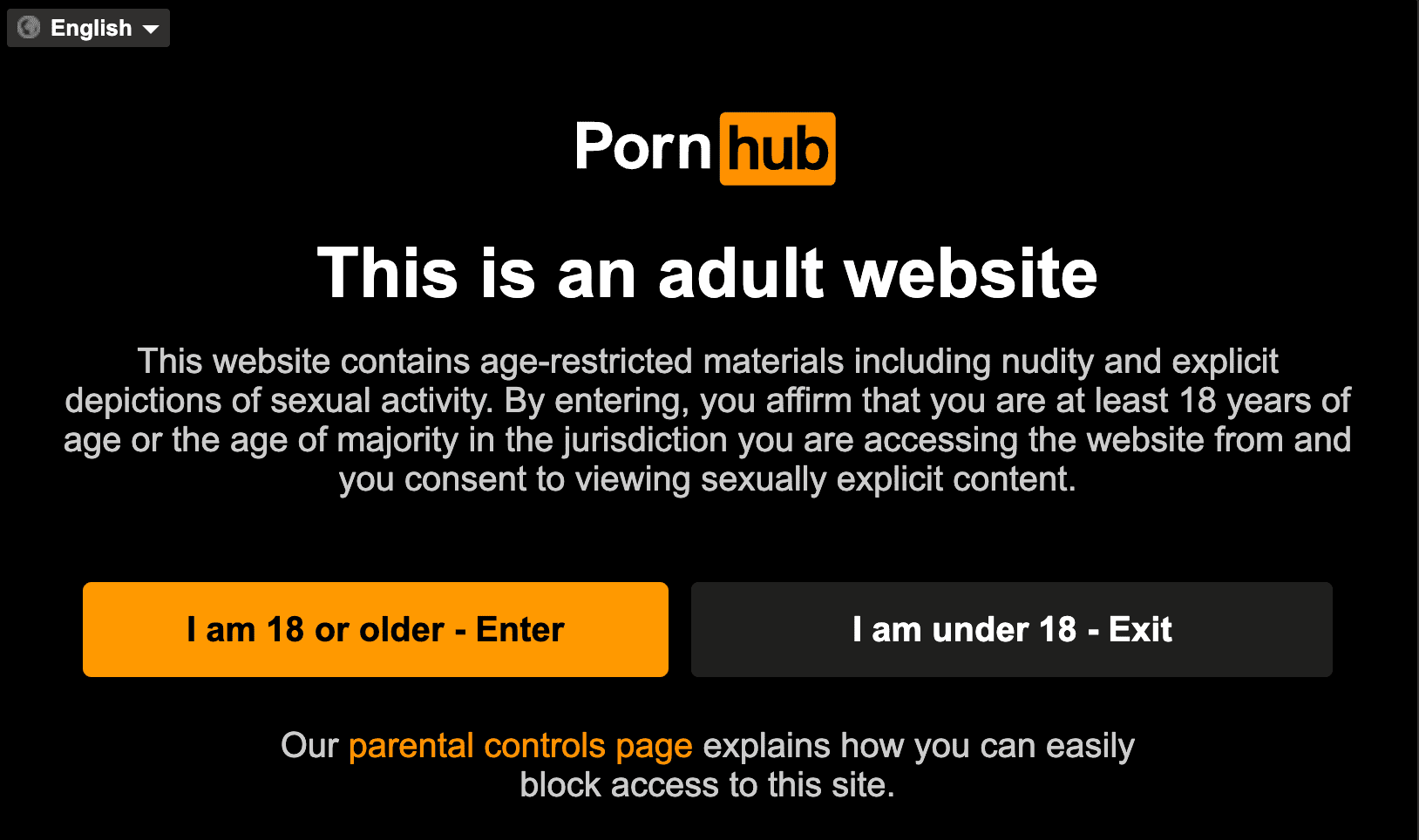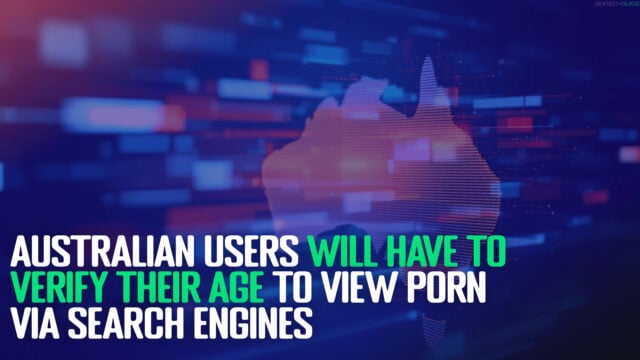From July 25, 2025, online porn in the UK is set to undergo a huge shift, that many say is overdue but many say raises troubling points regarding issues such as online privacy.
From this date, sites and platforms that allow the sharing of porn in the UK must implement robust age verification processes, to ensure that only people aged 18 or over access it. Age verification can include checks using official ID, credit cards and age estimation tools, and is also likely to have big implications for how porn is presented online.
But how will this affect your online experience? And how concerned should you be about privacy and other issues age verification has brought to the fore?

How is UK age verification for porn access changing?
On July 25, following the introduction of rules that form part of the UK government’s Online Safety Act, sites and platforms that allow the sharing of porn will need to implement thorough age verification processes before displaying porn to UK users.
The UK’s communications regulatory body, Ofcom, is tasked with enforcing the new rules, and has already launched investigations into sites that it suspects of falling foul of them. Websites that create and publish their own porn were compelled to bring in robust age verification earlier in 2025, ahead of the July 25 deadline for sites that just allow the sharing of porn.
Verification Methods
Robust age verification can include submitting government-recognised ID to prove that you’re 18 or over, and face-age estimation technology. The rules are not limited to dedicated porn sites, so, social media platforms that allow porn on them, such as Twitter, could fall under their remit.
Bluesky has already announced that it’s bringing in age verification for UK users, using ID, face-scanning or bank card submission. Users who don’t complete age verification won’t be able to access adult content on the platform, or use functions such as direct messaging.
Penalties for Non-Compliance
Sites and platforms that fail to bring in acceptable age verification can be fined up to ten percent of the company’s global annual turnover or £18 million ($24.5 million): whichever figure is greater.
Senior managers in companies failing to comply with the rules can be criminally prosecuted, and in extreme cases Ofcom can instruct internet service providers to stop working with non-complying sites, potentially shutting them down.
The bottom line: In the UK, to access porn sites the process is going to become more thorough than simply clicking a tick box to declare that you’re an adult.
Why is there an age verification crackdown?
The Online Safety Act was introduced to protect children from potentially harmful online content, which could include porn.
In the UK, as in many other countries, it is widely understood—if not accepted—by society that many under-18s will access online porn. With concerns about the effects of violent and misogynistic porn being raised while free porn sites such as Pornhub have become hugely popular, age verification is seen as a way to better restrict access to adult content.
Currently, many porn sites do not have proper age verification for adult content access in the UK, beyond perhaps a simple self-declaration box. If children do not have content restrictions on their devices, there is little to stop them from browsing hardcore porn.
Ana Ornelas, a Berlin-based erotic writer and advocacy officer with the Digital Intimacy Coalition, told SEXTECHGUIDE: “Major porn platforms have been getting away with lot and doing very little to protect both the users and those uploading content, while profiting immensely from the traffic on their websites. They have systematically failed to create a safe environment for users to engage with porn.”
The UK government said: “Protecting children is at the heart of the Online Safety Act. Although some content [covered by the Act] is not illegal, it could be harmful or age-inappropriate for children and platforms need to protect children from it.”
What actually changes on July 25?
Ofcom has already shown that it’s not messing around when it comes to cracking down on age verification for UK porn access. Earlier in 2025 it launched investigations into small porn sites over an alleged lack of age verification processes, as well as an investigation into some ‘nudify’ AI apps.
Aylo’s New Approach
Aylo, the Cyprus-based company that owns porn sites including Pornhub, RedTube and YouPorn, recently said it will bring in new age verification measures to comply with the new UK rules. This is at odds with Aylo’s strategy in other regions that have brought in tough age verification rules, including France and various US states, where Aylo has chosen to at least temporarily block access to its sites rather than implement robust age verification.
Aylo says that Ofcom’s model for age verification was “robust” and more realistic to implement than models seen in countries where the company had blocked porn content.
It’s possible that some sites may still choose to block access to their porn content in the UK, at least temporarily, rather than invest in robust age verification processes. But considering Aylo’s stance, it seems likely that compliance rates will be high, at least among the biggest porn sites.
Ornelas says that this will probably most commonly be achieved by porn sites using third-party age verification services that use official ID verification, rather than sites investing in creating internal secure age verification processes.
“Most likely, they [users] will be met with a banner which will ask for age verification before they can access the content,” she says. “They will be directed to a different website/app to insert their information, and only after this has been done, they will have the access granted.”
Andy Lulham, chief operating officer for age verification system Verifymy, says: “The process itself shouldn’t be too time-consuming, as email-based checks, for example, can be completed in seconds.”
He adds, perhaps in hope rather than expectation, that “visitors should be able to choose different methods of age assurance and pick the one with which they are most comfortable.”
With porn sites compelled to keep explicit content out of view before age verification is completed, it’s likely that many homepages won’t show porn anymore. Ornelas says: “Perhaps some platforms will invest in showcasing ‘softcore’ content before the age gate to retain users.”
Where should age verification for porn occur?
Ofcom requires porn sites and platforms to take responsibility for age verification, either with their own site processes or via linked third-part age verification systems.
Aylo has long argued that age verification should take place on devices, rather than on sites and platforms. This way, you’d verify that you’re an adult once on your device, then be able to access age-restricted content on it afterwards. This method would take away a lot of the legal risk around age verification for companies such as Aylo.
While device-level age verification isn’t set to become the norm under Ofcom’s rules, the crackdown has stimulated debate around this.
Paige Collings, a lawyer and activist with the Electronic Frontier Foundation, says that even if device-level age verification for porn or other age-restricted content were to become a legal norm, it would raise ethical issues around technology access.
“One additional consideration about device-level verification is that not everyone has access to a personal device,” she says. “Methods like a mini-ID wallet are device dependent and will majorly restrict people from accessing the internet if they share devices or access the internet through libraries, schools, or internet cafés, which do not accommodate personal age verification apps.”
VPN Circumvention
In countries and regions with online porn blocks, many people use virtual proxy networks (VPNs) on their devices, which ‘trick’ a device into behaving like it’s operating in another region, potentially circumnavigating regional blocks.
It’s already been shown that where porn blocks are applied, VPN usage spikes. In the UK, someone aged under 18 is likely to be able to easily use a VPN to circumnavigate UK age verification processes.
This potentially raises an interesting legal question for the near-future. Should sites and platforms become legally responsible to ensure that their age verification processes cannot be easily dodged through VPN use?
Lulham says: “The existence of VPNs does not remove the legal and moral duty on platforms to prevent, as far as they can, underage users visiting their sites.”
Is age verification a privacy risk?
Many people may be reluctant to submit official ID, that they fear may have the potential to publicly link them to porn, should a data breach occur.
Collings says: “Age verification is essentially identity verification. To do this, age verification systems need to collect data to verify the age of visitors, either by asking for government-issued documents or using biometric data, such as face scans.”
She adds: “This carries significant privacy risks, particularly around data breaches and the potential for data to be collected and potentially shared or sold to government agencies, third parties like data brokers, or other apps. It also carries risks of incorrect blocking where children or adults would be locked out of content by an erroneous estimate of their age.”
Most third-party age verification apps and systems tout their deep security and encryption measures, but no data-submission service can ever be 100 percent secure.
However, Lulham says: “The technology to put these digital safeguards in place is already here and should be embraced. It’s highly effective, fast, easy to use and designed to preserve the privacy of users.”
Will the rules push people to ‘darker’ internet corners?

One argument against more robust age verification for online porn is that if users can’t verify their age, or don’t want to, they could instead seek out porn on sites that may host more potentially harmful or illegal content.
Ofcom has already demonstrated that it will target small porn sites as well as big players for age verification implementation. But there will always be sites that evade enforcement to some degree, including many of those that host the most harmful content.
Lulham argues that these fears shouldn’t impinge on the new age verification rules, which he says are simply about bringing the law up to speed with how people use the internet now.
“There is an argument that restricting underage users’ access to adult platforms will push them to unregulated ones, but making the majority of sites safer will have a big impact and inaction [on age verification] is not an option,” he says. “Whilst some users might seek out less safe alternatives the majority will not and we shouldn’t let perfect get in the way of good.”
Ornelas says that sex education for children should include education about porn being performance, to help protect them from content they might see on such sites. She also says that tougher age verification shouldn’t lead to complacency with regard to sex education.
“If and teachers feel like the issue has been ‘taken care of’ by age gates exclusively, and sex and porn are never debated, kids might be even more vulnerable,” she says. “If a child is sent something they didn’t want to see and it’s traumatizing, they are not going to alert the caretakers if the general atmosphere is of guilt and shame.”
A new UK porn era

Beyond concerns about data privacy and porn-seekers potentially being pushed to ‘darker’ internet corners, concerns have been raised that more robust age verification processes could negatively affect online sex workers’ livelihoods. A higher barrier for porn access will always cause at least some users to stay away, potentially limiting income for those who make their living from porn content.
UK authorities have decided that the benefits of making it harder for children to access porn trumps concerns such as these, though, and from July 25, 2025 you’re probably going to have to decide if you’re happy to submit personal data if you want to access porn.
For Collings this means “eroding privacy and data protection, and limiting freedom of expression.”
She adds: “The internet must remain a place where all voices can be heard, free from discrimination or censorship by government agencies, and where we do not have to share our most intimate or personal data to access information and connect with each other.”
Many disagree, seeing the changes as legal frameworks belatedly catching up with the realities of how porn is accessed, in a way that other adults-only online industries such as gambling addressed long ago.
Ornelas calls age verification “just a first step” towards addressing the potential pitfalls of online porn access, and the ethical enjoyment of porn.
“We need to have a frank and larger conversation about why and how minors might access porn,” she says. “Age verification can only go so far. We need comprehensive sex education that teaches children that porn is performance. We need to address peer pressure. We need a much more profound conversation around this topic.”






Leave a Reply